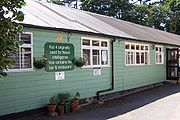- I J Good
-
Irving John „Jack“ Good (* 9. Dezember 1916 in London; † 5. April 2009 in Radford, Virginia, USA) war ein britischer Mathematiker und Kryptologe. Während des Zweiten Weltkrieges trug er wesentlich zur Entzifferung der deutschen Rotor-Schlüsselmaschine ENIGMA bei. In seinen Veröffentlichungen firmiert er fast immer als I. J. Good, während er von seinen Freunden zumeist „Jack“ genannt wurde.
Inhaltsverzeichnis
Leben
I. J. Good wurde als Sohn einer jüdischen Familie in der britischen Hauptstadt London als Isidore Jacob Gudak geboren und galt an der Schule als mathematische Frühbegabung. Er studierte ab 1935 Mathematik am Jesus College in Cambridge u. a. bei A. S. Besicovitch und Hardy und schloss sein Studium im Jahre 1938 ab. Danach arbeitete er dort noch eine Zeit lang als wissenschaftlicher Mitarbeiter, bevor er 1941 zur sogenannten Government Code and Cypher School (GC&CS) (deutsch etwa: „Regierungs-Code- und Schlüsselschule“) wechselte, wo er auch seine Doktorarbeit abschließen konnte. Bei GC&CS handelte es sich um eine Tarnbezeichnung für die (damals) streng geheime militärische Dienststelle, die sich im Zweiten Weltkrieg erfolgreich mit der Entzifferung des Nachrichtenverkehrs befasste, den die deutschen Militärs mit ihrer Schlüsselmaschine ENIGMA verschlüsselten. Sie hatte ihren Sitz im etwa 70 km nordwestlich von London gelegenen Bletchley Park.
In Bletchley Park arbeitete Good zunächst in Hut Eight (deutsch: „Baracke 8“) unter der Leitung von Alan Turing an der Entzifferung von Funksprüchen, die von der deutschen Kriegsmarine mithilfe der Enigma-M4 im Nachrichtenverkehr zwischen dem Befehlshaber der U-Boote (BdU) und den im Atlantik operierenden deutschen U-Booten verschlüsselt wurden. Später trat er Max Newmans Gruppe bei, die die deutschen Fernschreibverbindungen (britischer Codename: Fish) mit Geheimfernschreiber T52 und Lorenz-Schlüsselzusatz SZ42, von den Briten als Sturgeon (deutsch: „Stör“, die Luftwaffen-Version) und Tunny (deutsch: „Thunfisch“, die Armee-Version) bezeichnet, kryptanalytisch angriff. Dies führte zur Entwicklung des ersten elektronischen Rechners (Computers) der Welt, genannt Colossus.
Nach dem Krieg arbeitete Good zunächst an der Universität Manchester, wo er kurz am universitätseigenen Computerprojekt mitarbeitete, und dann bis zum Jahr 1959 wieder in geheimer Tätigkeit bei der GC&CS. Während dieser Zeit erwarb er Doktortitel sowohl aus Cambridge als auch aus Oxford.
Im Jahr 1967 wanderte er in die Vereinigten Staaten aus, wo er von 1967 bis 1994 als Professor an der Technischen Universität von Virginia (besser bekannt als: Virginia Tech) tätig war. Dort erfuhr ihm auch die besondere Ehre das Autokennzeichen „007 IJG“ zu erhalten. Offiziell wurde er 1994 emeritiert.
Good war bekannt für seine Arbeiten über Statistik, insbesondere der Bayes-Statistik, die er zusammen mit Turing auch für Entzifferungsarbeiten im Zweiten Weltkrieg nutzte. Darüber hinaus hatte er eine Vielzahl von Lehrbüchern über Wahrscheinlichkeitstheorie veröffentlicht. Er gilt außerdem als einer der Entdecker der Schnellen Fouriertransformation.[1] Good machte sich auch einen Namen als Schachspieler (Cambridge-Schachmeister 1939) und trug dazu bei, das vor allem in Ostasien bekannte Brettspiel Go in Europa bekannter zu machen. Good selbst hatte seinerzeit die Go-Regeln von Alan Turing gelernt.
Werke (Auszug)
- I. J. Good: Probability and the Weighing of Evidence. Charles Griffin, London, 1950.
- I. J. Good (Hrsg.): The Scientist Speculates. Heinemann & Basic Books, New York, 1962.
- I. J. Good: The Estimation of Probabilities. MIT Press, Cambridge, MA, 1965.
- D. B. Osteyee und I. J. Good. Weight of Evidence, the Singularity between Probability Measures and Signal Detection. In Lecture Notes in Mathematics, Springer-Verlag, New York, 1974.
- I. J. Good: Good Thinking: The Foundations of Probability and Its Applications. Univ. of Minn. Press, Minneapolis, 1983.
- Jack Good: Enigma and Fish. In Francis Harry Hinsley und Alan Stripp: Codebreakers – The inside story of Bletchley Park. Oxford University Press, Reading, Berkshire 1993, ISBN 0-19-280132-5.
- I. J. Good: Early work on computers at Bletchley, Cryptologia April 1979
- I. J. Good: Turing’s statistical work in World War II., Biometrika Bd. 66, 1979, S. 393 und in Turing Collected Works 1992
Seine Liste kleinerer Veröffentlichungen (2003) umfasst an die 2400 Einträge.[2]
Weblinks
PND: kein individualisierter Datensatz vorhanden (Stand: 8. April 2009) Nicht individualisierter Eintrag zum Namen Irving John Good im Katalog der DNB
- Fotos
- Homepage von I. J. Good (englisch)
- Biographie (englisch)
- Project Euclid, Interview (englisch) mit Banks Conversations with I.J.Good, Statistical Science 1996
- Newmanry Report von Newman, Michie, Good u.a. über die Entschlüsselung von Fish
Quellen
- ↑ Good The interaction algorithm and practical Fourier analysis, Journal Royal Statistical Society, Bd.20, 1958, S.361, zitiert von Cooley/Tukey 1965 in ihrer Originalarbeit zur FFT.
- ↑ Publikationen mit kurzen Noten (englisch)
Hugh Alexander | Shackleton Bailey | John Cairncross | Alastair Denniston | Harry Golombek | Irving John Good | Harry Hinsley | John Jeffreys | Dillwyn Knox | Donald Michie | Stuart Milner-Barry | Max Newman | John Tiltman | Edward Travis | Alan Turing | William Tutte | Peter Twinn | Gordon Welchman
Personendaten NAME Good, Irving John ALTERNATIVNAMEN I. J. Good KURZBESCHREIBUNG britischer Mathematiker und Kryptologe GEBURTSDATUM 9. Dezember 1916 GEBURTSORT London STERBEDATUM 5. April 2009 STERBEORT Radford, Virginia
Wikimedia Foundation.


